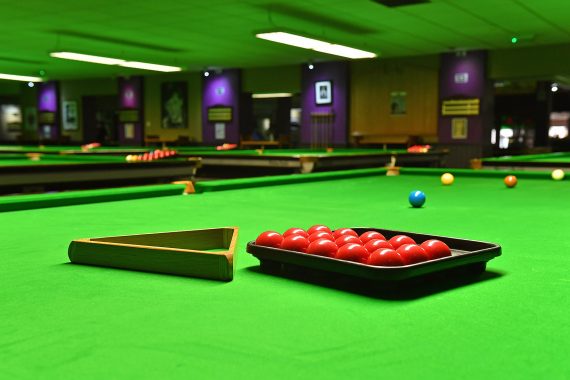The Role of the WPBSA
Over the course of the last five years snooker has seen rapid growth, not only of the main tour, but also in grassroots participation and its appeal globally.
At the heart of this has been the work of the World Professional Billiards and Snooker Association Limited (“The WPBSA”), led by its Chairman Jason Ferguson since his re-election to the board in May 2010.
Followers of all cue sports will likely be familiar with the sight of Jason at presentations around the world, but what exactly does his role involved and what is the remit of the WPBSA as a whole?
The short answer is that the WPBSA operates as the governing body for both snooker and billiards worldwide. Its stated aims include to promote, encourage and popularise both games generally, objectives that have in part been achieved on a practical level through the introduction of a number of important initiatives in recent years.
While that might sound simple, on further inspection it soon becomes clear just how many aspects there are to its work, including but not limited to the following…
Coaching
The WPBSA now has an established coaching programme, led by head of coaching Chris Lovell and supported by player director Steve Davis, as well as Andrew Highfield and Chris Motley.
The programme offers the opportunity to attain three levels of snooker coaching accreditation, with courses held on various dates each year.
In recent years, the courses have seen both current and former professional players, as well as international delegates graduate as WPBSA World Snooker Coaches. You can read more about those who have graduated from countries such as Austria, Sri Lanka, Brazil and Holland in 2015 here.
Cue Zone into Schools
In 2013, the WPBSA also introduced the Cue Zone into Schools, with the aim of taking the game into schools to encourage involvement in snooker from an early age.
Utilising six-foot snooker tables, with senior staff members being trained as WPBSA World Snooker Coaches, the concept is specifically designed to encourage involvement in snooker before and after school and during lunch breaks, as well as during English, Maths and sports lessons using Functional Snooker.
To date, the scheme has proven to be extremely popular and has seen over 14,000 children introduced to snooker in its first two years. Of these children, approximately 20% are girls and 10% have a disability.
It has also been used in schools in China, producing positive educational results.
Ladies
The WPBSA is also continuing to take steps to further encourage female participation in the game, notably taking the decision to award an invitational place at this year’s Betfred World Championship to ten times world ladies champion Reanne Evans.
As part of a new partnership recently announced by the WPBSA, there will also be a more fundamental restructure of the ladies game in England, which will now operate under the World Ladies Billiards and Snooker Limited (“WLBS”), a subsidiary of the WPBSA.
Disability
Similarly, the WPBSA has played an important role in the development of disability snooker, this year hosting the first National Snooker Disability Day during the Betfred World Championship in Sheffield.
In October, Sheffield will also host the 2015 UK Junior Disability Championship, while an adult disability tournament is set to be held between 27-29 November 2015 at the South West Snooker Academy in Gloucester, with entry and classification details to be released by the newly formed World Disability Billiards and Snooker Limited (“WDBS”) at the beginning of September.
International development
The WPBSA’s efforts are not just limited to within the United Kingdom however, as the game continues to grow internationally.
The establishment of recognised academies in China and Thailand (as well as the UK) by the WPBSA has played a key part in nurturing the development of young players in those territories.
Two of China’s most recent and notable graduates are youngsters Zhou Yuelong and Yan Bingtao, winners of this year’s World Cup tournament, having defeated several of the game’s most decorated and experienced professionals along the way.
While the decision was recently reached to allow 15-year-old Yan to defer his qualification for the main tour until 2016, 17-year-old Zhou is already into his second term and continuing to impress. Long-term residents of the WPBSA’s Chinese academy, both players look to have bright futures ahead of them.
There have been similar success stories from Thailand, most recently with winner of the girls category at the IBSF World U-21 Championship Siripaporn Nuanthakhamjan, being another player to have practised at the academy.
Billiards
Of course, the B in the WPBSA stands for billiards and the body has also played a key role in the development of what is now a healthy English Billiards tour, through its subsidiary company World Billiards Limited, chaired by former referee Alan Chamberlain.
During the last five years, the tour has seen growth from 12 entries in the World Championship, which was the only event, to over 80 from 17 different countries.
Only last weekend we saw the staging of the 2015 LITEtask UK Open, won by Roxton Chapman from a field of over 60 entrants, while further afield events have been held in Canada and New Zealand.
Rules
The role of the WPBSA is not only limited to encouraging participation and the development of the sport, but it also functions as the body responsible for the sporting rules and regulations of the game.
As well as his duties with World Billiards Limited, playing a key part in this role is WPBSA director Alan Chamberlain, who also chairs the Official Rules of Snooker/Technical Committee.
Integrity
In addition to managing the rules of the game, the WPBSA continues to play a key role in maintaining the integrity of the sport.
Working with other bodies such the Gambling Commission within the UK and through its partnership with the International Centre for Sports Security (“ICSS”), the WPBSA adopts a zero tolerance approach to corruption that can only benefit of the sport as a whole.
The cases of Stephen Lee and John Sutton are both a reminder of the need for vigilance and also examples of the consistent approach taken to such cases by the governing body.
Olympic Ambition
Although snooker was unsuccessful in its recent bid to be included in the 2020 Olympics, the WPBSA remains committed to one day see the sport take its place in the world’s leading international multi-sport event.
Holding a seat on the World Confederation of Billiards Sports (“WCBS”), the WPBSA continues to push for the sport’s inclusion and in 2017 we will see snooker return to the World Games, set to be held in Wroclaw, Poland.
The membership
Perhaps the most important fact to remember concerning the WPBSA is that since its incorporation over 30 years ago, it has always been a members association.
Its objectives are aimed primarily with the benefit of the members in mind and it follows that a more popular sport globally can only benefit the tour and therefore its members as a whole.
As well as the promotion of the sport, the WPBSA is also able to support its members in other more direct ways, including assistance with private healthcare, UK VISA support and other measures.
There is also the continued existence of the Professional Billiards and Snooker Players’ Benevolent Fund, to offer charitable assistance to professional billiards and snooker playing members of the WPBSA who find themselves in a position where they require financial support due to ill health/disablement or otherwise.
Such assistance is able to be provided through the revenue generated by the introduction of a 2.5% levy upon all prize money won in professional competition.
From the 2015/16 season, the WPBSA has injected £200,000 of that income back into the tour, increasing the amount of in prize money on offer at the earlier rounds of many ranking event tournaments.
Further income is also derived from the work that the WPBSA provides to World Snooker Limited (of which the WPBSA is a 26% stakeholder), which is then invested in sports development.
Summary
As is evident from the number of areas that I have looked at above (which are far from exhaustive), the role of the WPBSA and in particular its Chairman Jason Ferguson in snooker is both a multi-faceted and vital one.
Not only are they required to consider the immediate interests of its membership, but there is the wider, over-arching goal of promoting the game globally, in order to develop snooker in the longer-term.
So far, its work during the past five years in particular has helped to ensure that snooker is moving in the right direction and it will be interesting to see what more will have been achieved another five years from now and beyond…



